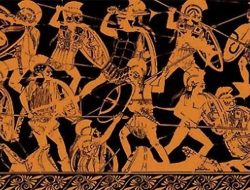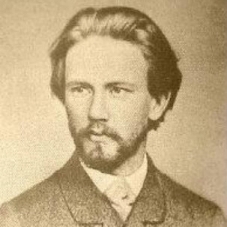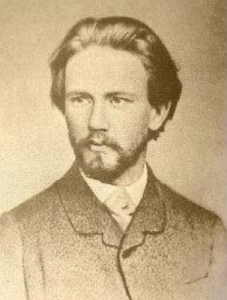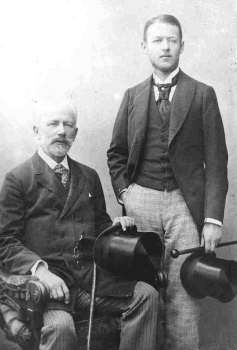I personally had no idea that the famous composer Tchaikovsky was homosexual and I have a feeling that the majority of people who haven’t studied a music history class probably don’t know this either. His music is widespread and considered by many to be some of the best, making him a household name. What we’ve never been told, however, is the fact that Tchaikovsky wasn’t only gay… but seemingly didn’t have any reservations about it.
After reading his story, I’ve come to have a great deal of admiration for Tchaikovsky’s life. He pushed boundaries, stood up to adversity, and was seemingly at peace with himself. While there is much speculation on some aspects of his life that we may never know about for sure, I think he makes a fascinating study for this entry in Right Under Our Noses.
-parchita
Pyotr Ilyich Tchaikovsky (1840-1893)
Pyotr Tchaivosky, one of seven children, was born in 1840 to a normal middle-class Russian family and no particular aspirations were laid upon the boy from his youth. His youthful, charming nature, however, quickly inspired their governess to start instructing Tchaikovsky and this doting attention proved to be an important initial motivation in his life. For a few early years, he was given piano instruction and proved himself to be quite good.
Before long, however, Tchaikovsky’s parents stopped indulging their son and started to prepare him for his lot in life. At the age of 10, Pyotr was sent off to a 2-year preparatory boarding school, giving him the basis he later needed for the 7 year training course at the Imperial School of Jurisprudence. This school would give him the training which needed to prepare him for an entry-level position as a civil servant.
When he was 14, Tchaikovsky received the shocking news that his mother had died from cholera. It’s uncertain what his relationship with his mother was, as some believe she was distant and others feel that she was affectionate and caring toward her child. In either case, it was an event which had a direct influence on Tchaikovsky, as he began working on a waltz, his first real composition, as a tribute to her memory.
His father was unmoved, however, and Tchaikovsky quickly returned to his schooling. It’s traditionally believed that it was here that Tchaikovsky first came to realize his sexuality. Homosexual acts were not uncommon between students at the Imperial School of Jurisprudence. It’s also where he began to find exposure to music, as he would normally attend the opera and other theatre performances with fellow students. He was known, during this time, to practice his hand at improvisation on the piano, which amused his fellow students. None of them, however, really believed that he would go on to make a name for himself. His piano tutor, as well, was known to have stated that while talented, there was nothing truly remarkable about Tchaikovsky.
This did not hold Tchaikovsky back, however, for over the next 15 years, Tchaikovsky continued to make strides in his music, going from student to professor with the Moscow Conservatory. His works were varied, from the well known ballets Swan Lake and The Nutcracker, to various symphonies and concertos. At various periods, his works were attacked by traditional Russian musicians and groups and although these criticisms were devastating to Tchaikovsky, he ultimately did not let them hinder his work. Later, by some of the very same people who attacked him, Tchaikovsky was called “a fully-fledged artist.”
As for Tchaikovsky’s personal life during this time, there are a number of proposed romantic interests that could be explored, although none can be absolutely proven. Pyotr’s servant, Aleksei Sofronov, as well as Vladmir Davydov are two frequently mentioned names as potential lovers of Tchaikovsky. His Sixth Symphony was dedicated to Davydov and a gentleman by the name of Eduard Zak is believed to have inspired the love theme in Tchaikovsky’s Romeo and Juliet.
Perhaps even more surprising is the nature in which Pyotr Tchaikovsky processed his homosexuality. Based on personal letters and other writings, it seems that Tchaikovsky was comfortable with himself, which is not an attitude often found in 19th Century Russia. One researcher concluded that Tchaikovsky “eventually came to see his sexual peculiarities as an insurmountable and even natural part of his personality … without experiencing any serious psychological damage.” (Anthony Holden, Tchaikovsky, A Biography.)
Working under this assumption, one if left to wonder about Pyotr Tchaikovsky’s very brief and unsuccessful marriage to Antonina Miliukova, a former student. After only a few months, the emotional turmoil of this marriage grew to be too much for Tchaikovsky to handle, and he and his wife separated. He took a long break in Switzerland and, while there, produced some of his finest pieces of music. Later reflecting on his marriage, Tchaikovsky offered no real defense but temporary insanity. In a letter to his brother, he also reflected that there was, “nothing more futile than wanting to be anything other than what I am by nature.”
For the rest of his life, Tchaikovsky continued to write and gain recognition and admiration. A wealthy patroness (possibly supplied by one of Tchaikovsky’s lovers) supported him for a full 13 years and Tsar Alexander III, in 1884, conferred upon him the Order of St. Vladimir. This enhanced his reputation quite a bit and, for the final years of his life, Tchaikovsky recognized a great deal of international success until his death at age 53.
While this summary barely touches on the vast life of Pyotr Tchaikovsky, I feel as if this brief glimpse shows just how remarkable this man was. He did not stand out as a youthful prodigy, but this did not stop him from becoming one of history’s greatest composers. The dedication he showed to his true passion for music, his perseverance against the negative and sometimes harsh criticism coming his way, and his bravery toward accepting his true, honest nature all came together to make Tchaikovsky a resounding success. Despite the fact that his homosexuality was all but hidden in the history books, we can all take a note from Tchaikovsky’s story and allow his strong character to touch our own lives and help light the way to our own successes.
Discuss Tchaikovsky in the forums!
Tags: 19th century homosexual, Anthony Holden, classical composer, classical music, Gay, gay history, gay music, gay musician, gay Russian, gay Tchaikovsky, gay-nerds, homosexual, Imperial School of Jurisprudence, lesbian nerds, LGBT role models, Music, proud, Pyotr, Right Under Our Noses, Romeo and Juliet, Sleeping Beauty, Swan Lake, Tchaikovsky, Vladmir Davydov





















